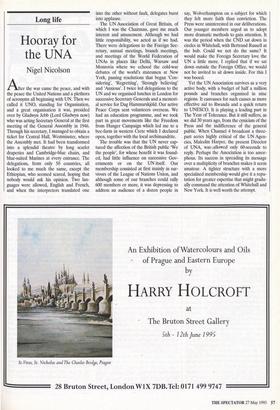Long life
Hooray for the UNA Nigel Nicolson
After the war came the peace, and with the peace the United Nations and a plethora of acronyms all beginning with UN. Then we called it UNO, standing for Organisation, and a great organisation it was, presided over by Gladwyn Jebb (Lord Gladwyn now) who was acting Secretary General at the first meeting of the General Assembly in 1946. Through his secretary, I managed to obtain a ticket for Central Hall, Westminster, where the Assembly met. It had been transformed into a splendid theatre by long scarlet draperies and Cambridge-blue chairs, and blue-suited Marines at every entrance. The delegations, from only 50 countries, all looked to me much the same, except the Ethiopian, who seemed scared, hoping that nobody would ask his opinion. Two lan- guages were allowed, English and French, and when the interpreters translated one into the other without fault, delegates burst into applause.
The UN Association of Great Britain, of which I was the Chairman, gave me much interest and amusement. Although we had little responsibility, we acted as if we had. There were delegations to the Foreign Sec- retary, annual meetings, branch meetings, and meetings of the World Federation of UNAs in places like Delhi, Warsaw and Monrovia where we echoed the cold-war debates of the world's statesmen at New York, passing resolutions that began 'Con- sidering', 'Regretting', 'Strongly believing' and 'Anxious'. I twice led delegations to the UN and we organised lunches in London for successive Secretary Generals and a memori- al service for Dag Hammarskjold. Our active Peace Corps sent volunteers overseas. We had an education programme, and we took part in great movements like the Freedom from Hunger Campaign which led me to a bee-farm in western Crete which I declared open, together with the local archimandrite.
The trouble was that the UN never cap- tured the affection of the British public 'We the people', for whose benefit it was found- ed, had little influence on successive Gov- ernments or on the UN itself. Our membership consisted at first mainly in sur- vivors of the League of Nations Union, and although some of our branches could rally 600 members or more, it was depressing to address an audience of a dozen people in say, Wolverhampton on a subject for which they felt more faith than conviction. The Press were uninterested in our deliberations. Our younger members urged us to adopt more dramatic methods to gain attention. It was the period when the CND sat down in circles in Whitehall, with Bertrand Russell at the hub. Could we not do the same? It would make the Foreign Secretary love the UN a little more. I replied that if we sat down outside the Foreign Office, we would not be invited to sit down inside. For this I was booed.
Yet the UN Association survives as a very active body, with a budget of half a million pounds and branches organised in nine regions. It canvasses for such causes as more effective aid to Rwanda and a quick return to UNESCO. It is playing a leading part in The Year of Tolerance. But it still suffers; as we did 30 years ago, from the cynicism of the Press and the indifference of the general public. When Channel 4 broadcast a three- part series highly critical of the UN Agen- cies, Malcolm Harper, the present Director of UNA, was-,allowed only 60-seconds to reply. Perhaps the Association is too amor- phous. Its success in spreading its message over a multiplicity of branches makes it seem amateur. A tighter structure with a more specialised membership would give it a repu- tation for greater expertise that might gradu- ally command the attention of Whitehall and New York. It is well worth the attempt.


































































 Previous page
Previous page